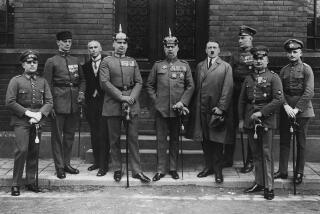Case of Accused Ex-Nazi Strikes a Raw Nerve in Argentina
BUENOS AIRES — Forty-five years later, Abraham Secemski’s memories of Josef Schwammberger hadn’t faded: “A friend of mine--we went to school together--was a few rows behind me at roll call. Mr. Schwammberger ordered him forward, because his face wasn’t washed. The minute he stepped out, Schwammberger shot him.”
Secemski survived nine Nazi labor camps in Poland. “I forgot the others. But Mr. Schwammberger I never forgot.”
A retired clothes designer who lives in Chicago, Secemski heard of Schwammberger’s arrest in an Argentine village last November and “I immediately went to the synagogue to thank God.” Then he called the Simon Wiesenthal Center in Los Angeles, which hunts Nazis, and said, “I know that man.”
Secemski and two other survivors knew that Argentina was a haven for fugitive Nazis after World War II, so they were tense when they arrived this month to testify against the fifth-most-wanted Nazi, accused of direct responsibility for the death of at least 5,000 Jews in war-time Poland.
But, said Secemski, “Young people need to be aware of what dictatorship means.” And, he added, “If these characters get away with it, what will prevent another group from doing it again, and then going into hiding or just going free?”
That sentiment touches a raw nerve these days in parts of Latin America, where democratic governments are wrestling about whether and how to judge previous military regimes accused of human rights abuses.
No one suggests that a military regime’s so-called “dirty war” against left-wing subversion in Argentina in the 1970s approximates the Nazi evil of the Holocaust. The debate turns, rather, on the principle of accountability.
President Raul Alfonsin was elected president in 1983 after more than seven years of military dictatorship, during which 9,000 people were killed or disappeared in the “dirty war,” according to documents compiled by human rights organizations. Amnesty International estimates that there were at least 20,000 additional such cases, so far undocumented.
Alfonsin and his supporters made human rights a national issue. For the first time, a Latin government jailed several former junta members for capital crimes, and in April, won the extradition from the United States of fugitive Gen. Guillermo Suarez Mason, accused of direct responsibility for 39 murders.
Alfonsin is said to be personally interested in pressing the Schwammberger case, in which West Germany seeks to extradite the 76-year-old former labor camp commandant, to lay to rest Argentina’s reputation as a Nazi haven.
In the last year, however, Alfonsin has stepped back from the confrontation with this country’s military, pushing through two laws that have all but halted prosecutions of “dirty war” crimes. He did so, he said, “with great distaste,” but in recognition of military anger that he judged a threat to the future of democratic rule.
For defenders of the military, its ruthless tactics were a necessary evil in a vicious and thankless war against terrorism. Other Argentines are less forgiving of the excesses, but they recognize a Latin American reality: the military here remains a powerful force.
The military’s power tempers responses elsewhere in the region. Neighboring Uruguay enacted a blanket amnesty law covering its 1973-85 military regime, although the law is now being contested by a citizens’ group. Brazil also adopted an amnesty.
In the case of fugitive Nazi Schwammberger, Secemski has no doubts that he should be judged.
“There is no punishment severe enough. To kill him would be to sink to his level, but he should get some of his own treatment,” the survivor said in an interview during his four-day visit.
Secemski spent several months in Rozwadow labor camp in Poland under Schwammberger in late 1942, when he was 17, and bears a scar on his nose that he said Schwammberger inflicted.
“Three days in Schwammberger’s camp, and you dried up. . . . You had no tears,” he said. “People were falling like flies. And instead of pitying them, we envied them. We envied the dead.”
Secemski said he and a brother, both injured by guards, were taken to a hospital, which he described as a miraculous escape from death, and they saw no more of Schwammberger. The two brothers survived, but 97 others in their extended family did not.
Edward Blonder, now of Miami, and Morris Reiter, of Toronto, who had been interned at another camp where Schwammberger was commandant, joined Secemski here to testify at a pretrial hearing. Schwammberger, 76, chose not to attend. He is in custody awaiting the first of two trials, one on revoking his citizenship and the second on extradition.
Schwammberger was arrested in his native Austria in 1945 with eight sacks of plundered jewelry, watches and gold teeth, according to Austrian records. In a statement to Austrian police, he admitted he shot 35 Jews at one camp where he served--following orders to shoot those who had tried to escape.
Testimony by other survivors immediately after the war, submitted to Argentine authorities, accuses Schwammberger of shooting hundreds of Jews, stealing their jewelry and throwing them into bonfires.
Rabbi Marvin Hier, dean of the Simon Wiesenthal Center, has said that Schwammberger personally was responsible for the deaths of about 5,000 Jews.
Schwammberger escaped from Austrian prison and made his way to Argentina, living for decades in La Plata, an industrial center. He was traced there in 1972, but vanished again. Last October, the Wiesenthal Center named him No. 5 on its list of wanted Nazi fugitives, and West Germany raised the reward for his arrest from $25,000 to about $300,000. His picture appeared in many Argentine newspapers.
Acting on a tip, police arrested Schwammberger on Nov. 14 in Huerta Grande, a village outside the provincial capital of Cordoba. The government immediately filed charges, saying that his Argentine citizenship was obtained on false grounds in 1965.
If he is extradited and convicted, Schwammberger would join the many thousands of Nazis convicted of war crimes. Most were tried by American, French, British and Soviet tribunals in occupied Germany after the war ended.
Here in Argentina, about 1,200 soldiers and police were originally accused of murder, torture and other “dirty war” offenses, including throwing prisoners from helicopters. Complaints were filed against 692 of them, said Octavio Carsen, director of the Center for Legal and Social Studies, a human rights group.
After a barracks uprising in April, 1987, Alfonsin agreed to a law imposing a deadline for complaints, anticipating a plunge in the number of suits. But lawyers hurriedly filed hundreds of cases. So Alfonsin’s government won passage of the Due Obedience Law, absolving officers who were carrying out orders.
Now, acquittals are announced each week under the due obedience measure. Only about 60 officers still face charges, and many of them are likely to be acquitted as well, Carsen said.
“There is a great contradiction in Argentina being more disposed to extradite a Nazi for crimes committed more than 40 years ago than to condemn our own, quote, Nazis, for more recent crimes,” Carsen said.
A total of seven people, including former military President Jorge R. Videla, have been convicted and jailed so far for human rights violations.
Alfonsin’s measures seem to have satisfied the armed forces. In January, the military itself put down a second rebellion.
Jacobo Timerman, a Jewish Argentine who was tortured during 29 months in detention by the military government, said, “If I react only with my feelings, I would like to see all of them hanged. But I am not sure that anything else was possible. . . . I am not sure the people were willing to risk another dictatorship.
“If we build a democracy here, the military cannot come back,” he said. “But if we let the crazy left try to create an institution out of remembering, and only that, the military will come back. Because who will face them if there is no democracy?”
More to Read
Sign up for Essential California
The most important California stories and recommendations in your inbox every morning.
You may occasionally receive promotional content from the Los Angeles Times.










